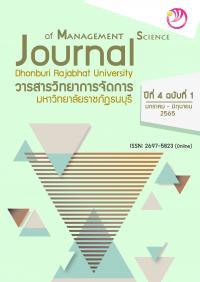Consumer Behavior and Service Marketing Mix in Purchasing Condominiums in Samut Prakan Province
Keywords:
Consumer behavior, Service marketing mix, CondominiumsAbstract
The objectives of this research were 1) to study consumer behavior in purchasing condominiums in Samut Prakan Province, 2) to analyze the composition of the service marketing mix in purchasing condominiums among consumers in Samut Prakan Province, and 3) to study the condominium purchasing decision factors based on the service marketing mix concept. The data were collected from 400 consumers in Samut Prakan Province. The data were analyzed by using frequency distribution, percentage, mean, standard deviation, and confirmatory factor analysis. The results showed that the consumers in this study tended to find condominiums near their workplace and search for condominium information through the internet or websites. The consumers’ purchasing behavior was mostly influenced by themselves. Studio-type condominiums with a size of between 26 and 30 square meters and a price range of between 1,000,001 and 2,000,000 Baht were mostly purchased or intended to be purchased. Based on the service marketing mix concept, the factors with the highest loading impacted condominium purchasing behaviors in Samut Prakan Province were product, price, promotion, area/location, physical appearance, service process, and personnel. All condominium purchasing decision factors based on the service marketing mix concept were reported at a high level. The factor with the highest mean was price, followed by products, personnel, area/location, promotion, physical appearance, and service processes, respectively.
References
กระทรวงการท่องเที่ยวและกีฬา. (2563). รายงานภาวะเศรษฐกิจการท่องเที่ยว. COVID-19 กับผลกระทบต่อการท่องเที่ยวไทย. 1(4), 4-26. สืบค้นจาก https://www.mots.go.th/download/TourismEconomicReport/4-1TourismEconomicVol4.pdf
กระทรวงการท่องเทียวและกีฬา. (2565). รายงานภาวะเศรษฐกิจการท่องเที่ยว. BCG. 3(1), 86-94. สืบค้นจาก https://www.mots.go.th/news/category/663
กองเศรษฐกิจการท่องเที่ยวและกีฬา กระทรวงการท่องเที่ยวและกีฬา. (2564, 13 มกราคม). สถานการณ์ด้านการท่องเที่ยวไทย. สืบค้นจาก https://secretary.mots.go.th/policy/
ณัฐวุฒิ เผ่าทวี. (2563, 4 พฤษภาคม). คาดการณ์พฤติกรรมมนุษย์และเศรษฐกิจโลกหลังโควิด.สืบค้นจาก https://www.prachachat.net/d-life/news-459514
ปิยพร อรุณเกรียงไกร. (2563, 1 กรกฎาคม). Future of Travel: อนาคตของการท่องเที่ยวอยู่ตรงไหนในยุคโควิด-19. สืบค้นจาก https://www.creativethailand.org/view/article-read?Article_id=32496
รพีพรรณ รัตนวงศ์นรา มอร์ด. (2563, 22 กุมภาพันธ์). วิธีป้องกันเชื้อไวรัสโคโรนา 2019 (COVID-19). สืบค้นจาก https://www.rama.mahidol.ac.th/atrama/issue035/health-station
ศูนย์ปฏิบัติการภาวะฉุกเฉิน กรมควบคุมโรค. (2565, 11 พฤษภาคม). รายงานสถานการณ์โรคติดเชื้อไวรัสโคโรนา 2022. สืบค้นจาก https://ddc.moph.go.th/viralpneumonia/index.php
ศูนย์วิจัยธนาคารกรุงไทย. (2563, 22 สิงหาคม). เจาะพฤติกรรมท่องเที่ยวใน New Normal: เมื่อโควิดทำชีวิตเปลี่ยน. สืบค้นจาก https://krungthai.com/th/krungthai-update/news
สยามรัฐออนไลน์. (2563, 10 เมษายน). โควิด-19 ส่งผลกระทบต่อภาคอุตสาหกรรมท่องเที่ยวไทย เป็นอันดับหนึ่งของโลก. สืบค้นจาก https://siamrath.co.th/n/146002
องค์การอนามัยโลกประเทศไทย. (2565, 12 พฤษภาคม). Coronavirus (Thailand). สืบค้นจาก https://www.who.int/thailand/health-topics/coronavirus
Divisekera, S. & Nguyen, V. K. (2018). Determinants of innovation in tourismevidence from Australia. Tourism Management. 67:157-167.
Flor, M. L., Cooper, S. Y., & Oltra, M. J. (2018). External knowledge search, absorptive capacity and radical innovation in high-technology firms. Journal ofEuropeanManagement. 36(2):183-194.
Fuchus, M. et al. (2019). E-business readiness, Intensity, and Impact: An Austriandestination management organization study. Journal of Travel Research. 49(2):165-178.
He, Z. et al. (2018). When art meets tech: Th e role of augmented reality inenhancingmuseum experiences and purchase intentions. Tourism Management. 68:127-139.
ICAO. (2022, 5 May). Effects of Novel Coronavirus (COVID‐19) on Civil Aviation: EconomicImpact Analysis. Retrieved from https://www.icao.int/sustainability/Pages/Economic-Impacts-of-COVID-19.aspx
Khatri, I. (2018). Innovation research in tourism business: A review from twodecades of studies. Journal of Tourism. 19(1):15-27.
Li, J. et al. (2018). Media representation of digital-free tourism: A critical did courseanalysis. Tourism Management, 69:317-329.
Longwoods International. (2022, 21 May). Travel Sentiment Study Wave 7. Retrieved from https://longwoods-intl.com/news-press-release/covid-19-travel-sentiment-study-wave-7
Loten, A. (2017). Digital business, software drive IT spending growth. Journal of Wall Stree.Januszewska, M., Jaremen, D. E. &Nawrocka, E. (2015). The effects of the use of ICT by tourism enterprises, Service Management. 2(16):65-73
McKinsey. (2020, 14 May). Hitting the road again: How Chinese travelers are thinking aboutTheir first trip after COVID-19. Retrieved from https://www.mckinseycom/featured-insights/asia-pacific/hitting-the-road-again-how-chinese-travelers-are-thinking-about-their-first-trip-after-covid-19#
Neidhardt, J., & Werthner, H. (2018). IT and tourism: still a hot topic, but do not forget IT. Information Technology & Tourism. 20:1–7
UNWTO. (2020, 29 October). International Tourism Down 70% as Travel Restrictions ImpactAll Regions. Retrieved from https://www.unwto.org/taxonomy/term/347
World Health Organization. (2020, 12 October). WHO Coronavirus Disease (COVID-19) Dashboard. Retrieved from https://covid19.who.int/?gclid=Cj0KCQjwuL_8BRCXARIsAGiC51BjNjLZSUekpV7CxQP0g7vRCnHxpSiV66xPxTeYIOmvc1yi8glEhgaAvciEALw_wcB
Watkins M., Ziyadin S., Imatayeva A., Kurmangalieva A.,&Blembayeva A. (2018). Digitaltourismas a key factor in the development of the economy .Economic Annals-XXI. 169(1-2): 40-45
Ziyadin, S., Suieubayeva, S., &Utegenova, A. (2020). Digital Transformation in Business. Lecture Notes in Networks and Systems. 84: 408-415
Ziyadin S., Koryagina E., Grigoryan T., Tovma N.,& Ismail G. (2019). Specificity of using information technologies in the digital transformation of diversification tourism. International Journal of Civil Engineering and Technology (IJCIET) Volume 10. 1:998-1010
Ziyadin, S., Oleg, L., Marina, D., Gulzhihan, S., & Maiya, S. (2019). Diversification tourism in the conditions of the digitalization. International Journal of Civil Engineering and Technology. 10(2):1055-1070
Downloads
Published
How to Cite
Issue
Section
License

This work is licensed under a Creative Commons Attribution-NonCommercial-NoDerivatives 4.0 International License.







